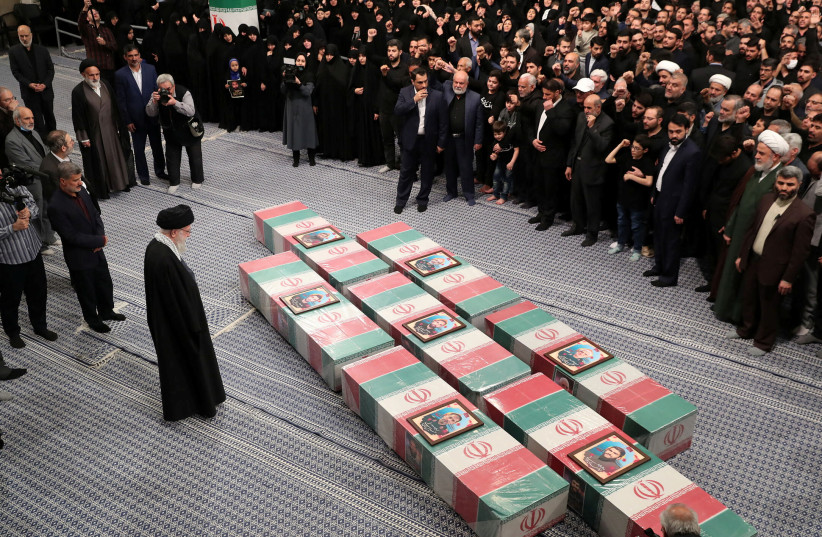One can only guess how Iran and its proxies will retaliate for Ismail Haniyah’s assassination beyond the usual slew of missiles launched by Hezbollah in Lebanon and Hamas in the South. Nor can Israel’s reaction to an attack be predicted or even the final outcome – whether the sides will back down or if there will be a full-scale war.
There is, however, one certainty in all this fog: If Israel retaliates directly against Iran, it should hit at regime targets and refrain as much as possible from harming the Iranian population and its economic welfare.
This is easier said than done.
Iran’s two key vulnerable points, the island of Kharg and the Bandar Abbas complex of three ports along Iran’s vast southern shores are very tempting objectives.
In a minute rectangle 3 km. long and 1.5 km. wide on the small island of Kharg is stored 80% of the oil Iran exports to the world. This area, smaller than Ben-Gurion Airport, not only invites an Israeli attack for its size but also due its relative proximity to Israel. It is located just off the western shores of Iran.

One can safely assume that many Israel Air Force pilots know exactly how to get there, how to destroy a part or all of the facility, and have been training for the event for years. Israel has frequently publicized IAF exercises in Greece, which is both mountainous and has many islands, the ideal terrain to train for the attack on Iran.
The complex of three ports in and near the city of Bandar Abbas on Iran’s southern shores presents a greater challenge to Israeli forces but is hardly insurmountable.
The problem with attacking this infrastructure is the devastating consequences it would have on the welfare of the Iranian people. Oil export earnings account for at least 40% of the regime’s national expenditures. The Bandar Abbas complex accounts for 70% of Iran’s container imports, Iran’s imports of finished products. True container shipments are only a small portion of total imports – the bulk of shipments involves raw products such as wheat – but without these finished products one lives in the 19th century instead of the 21st.
'The small Satan'
HARMING THE Iranian people would be a mistake. It is the regime that seeks Israel’s eradication, not the Iranian people.
A good indication of this basic fact is provided by Google Trends, which plots searches of various terms by country, province, and if searched enough, even by city.
Plugging in two terms in Farsi for “Israel” and the “small Satan,” the pejorative term frequently employed by the regime shows this clearly. While Israel merits an average score of two (from the peak of searches for the term at 100), average searches for the small Satan are so few that they do not merit giving a score in the first place.
Inserting the term “the Zionist entity,” another pejorative term frequently aired by the regime, yields the same results among Iranians searching the Internet in the privacy of their homes.
These findings are reflected in the videos of poorly attended demonstrations the regime sponsors whose highlight is the burning of either the American and Israeli flags, or both, depending on the circumstances.
In general, Iranian Internet users do not take much interest in Israel except during times of crisis between the two countries, as the two peaks indicate. The first was when Israel was attacked by Hamas terrorists on October 7, 2023; the second was Iran’s April attack on Israel. Otherwise, there are so few searches for either Israel or its pejorative that the distribution of searches for either term on the provincial level is provided for only three of Iran’s 31 provinces.
Plug in “Islam,” let alone “sports” (searched eight times more than Islam), and the term Israel does not receive even an average score over five years of searches. But neither does Ruhollah Khomeini, founder of the Islamic Republic of Iran.
Iranians’ love of sports, and their interest in Islam, which does not include Khomeini, means that the public at large is not at war with Israel. One would have expected that during the peaks of crisis, searches for the pejorative “small Satan” would rise as well as searches for “Israel,” but few such searches show up on the graph.
Israel must do everything possible to avoid hitting civilian infrastructure, as tempting as the Kharg oil installations and the Bandar Abbas complex of ports may be.
This is a difficult decision to make when attacking a distant country over 70 times the size of Israel, whose nuclear installations and other regime infrastructure are often hidden under mountainous terrain.
But then again, Israel should not be at war with 85 million Iranians. The ayatollahs, the political hardliners in power, and the Revolutionary Guard are enough to handle.
The writer is a senior researcher at the Jerusalem Institute for Strategy and Security, and professor (emeritus), Bar-Ilan University.
